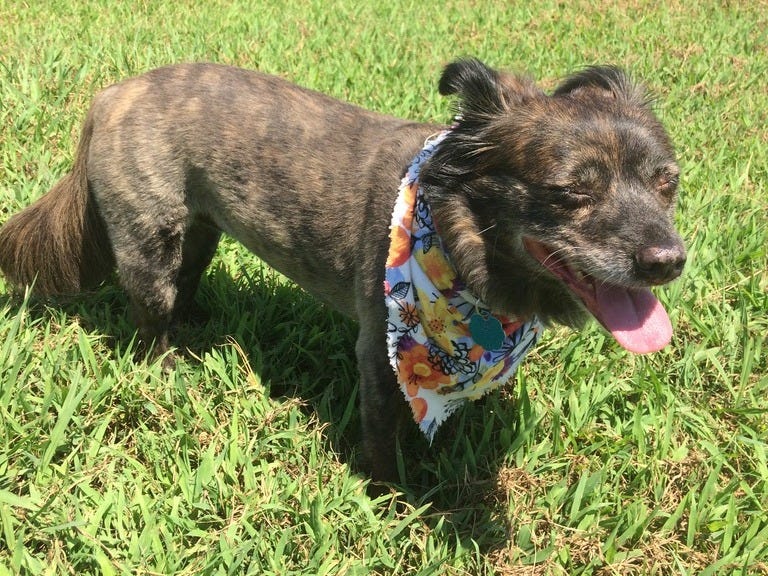But most of all /
He was my best friend /
And he’s gone too soon.—Sturgill Simpson, “Sam”
On Tuesday, around 4:30 p.m., my faithful dog of nearly 14 years, Gilda Bear Canever, took her final breath. She was a good dog, and I want to tell you about her, in part, to see if it’ll help me feel less sad the next time I go into the garage and see the empty spot where her bed once was, or I get up to let her out and realize she’s not coming.
Gilda is the same name she was given at Young-Williams, where I got her the same week I left New Jersey for Knoxville in July 2011. She came free with a bag of dog food, and though I thought only of the adventures we would take as Man and Dog when I brought her back to my first apartment, she would see me through two marriages and a divorce, three children, and six more homes before the doctor’s needle made her sleep forever.
Gilda loved two things most of all: food and people.
But she also enjoyed belly rubs, running away from home, and not wearing a leash at the park, or before we paid to have a fenced-in yard (installed just for her), so she could run away more easily. Many times, I found her chasing squirrels in the woods or eating garbage on the side of a busy road. Once, during a thunderstorm, when I thought she was gone for good, I called the vet’s office the minute that it opened, groggy from a night of restless sleep, and was told she’d been brought in by an older woman who had seen her wandering. “She said she ran in through the door and jumped up on her couch, like she’d lived there all along,” the worker at the front desk told me when I showed to pick her up. Gilda came out wagging, her ears all the way back, as if to say, “Hope you’re not too mad, can we eat now?”
That was Gilda.
And it’s one reason I was drawn to her and not the puppies or doodles or other dogs with more favorable descriptions at the shelter. The words the kind folks at Young-Williams had written on her paper were a lie: a 2-year-old Papillon mix, despite the gray stubble on her chin and a snout big enough to swallow a whole sparrow1. “Bit of a food bully. Careful around small dogs. But really friendly!!”
I saw her through the glass, sitting on the flimsy bed in her kennel, staring right back at me, and I knew we would be us.
“I’ve seen things,” Gilda said through those big, emotive eyes she never lost. “Been places I don’t want to go back—though I will, if I have to. You take me home, though, and I’ll be the best friend you ever had. I’ll dig my muzzle in your belly when you’re sad, let you take me out on kayaks where I might fall and drown, whatever, as long as you give me a warm place to sleep and a bowl of food that’s never empty.”
Until her body and mind started to fail, about a year ago, Gilda loved people with the purest form of love. Our first year, when the dog park was our daily haunt, she’d push her way through rows of canines to the first bench occupied by humans, wagging her tail and dropping to her side, as if to say, “Hey, if that guy leaves without me, would you want to take me home?” She would proceed to do this to every other person there, pushing their own dogs out of the way so she could be petted.
She was scrappy and tough, like any former stray, and had a bit of a Napoleon complex. But she melted human hearts like they were made of butter on a summer day.
When it was time for us to find a roommate after my divorce, we interviewed the candidates together, settling on a dude who, for the next year, would keep his bedroom door open so she could alternate beds throughout the night. He would be one of many dog-sitters she would cajole into watching her for free.
Though she would sleep anywhere, Gilda favored couch cushions and the foot of the mattress. Because she was rarely denied treats or attention, she was a willing participant when used to lure in babes during the desert year of my singleness. She sat beside me at coffee shops while I read Hemingway and smoked tobacco pipes to look cool and mysterious. Though she preferred Mead’s Quarry, where she’d ride with me in kayaks and paddleboards, and Sequoyah Park, where I’d let her loose within a hundred yards of any pretty female and tell her, “Do your thing, old girl.”
Unfortunately, for Gilda, the woman who became her New Mom had no intention of sharing a bed with a dog. “She was here first, you know,” I told Haley, on Gilda’s behalf, after we’d stayed up all night—me and the dog—debating my engagement, and she—the dog—only softened after I promised to at least secure for her a futon. Haley would eventually soften, too. Though she did not sleep in a human bed from July 20, 2018, Gilda would get her own furniture and, for a time, a basement apartment, until she could no longer make it up the stairs to ask to be let out and started peeing on the carpet.
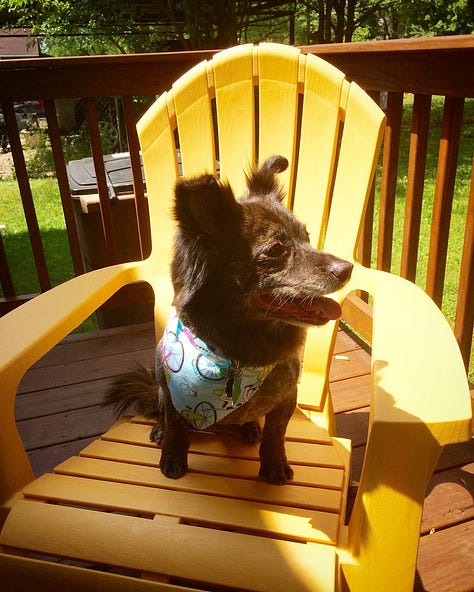
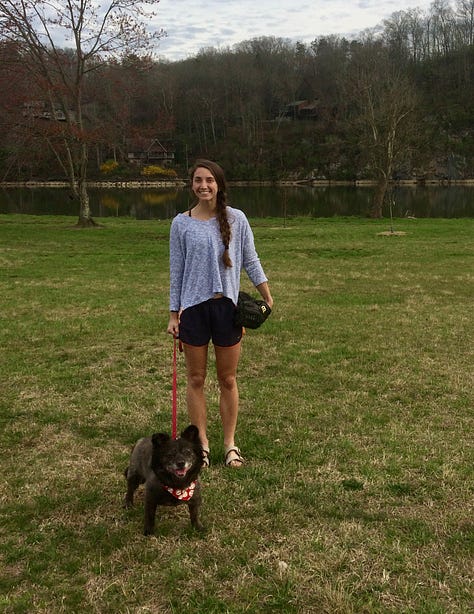
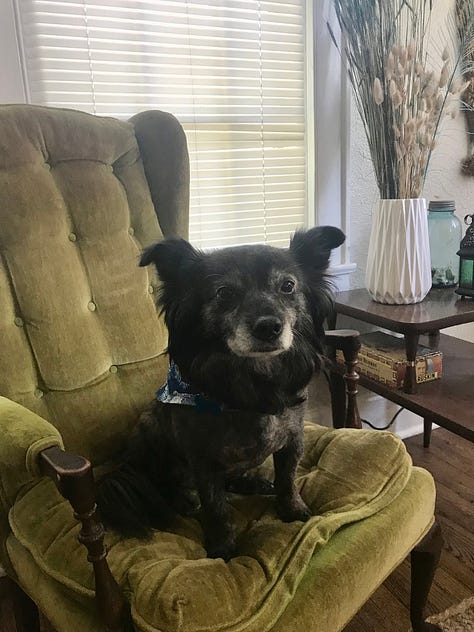
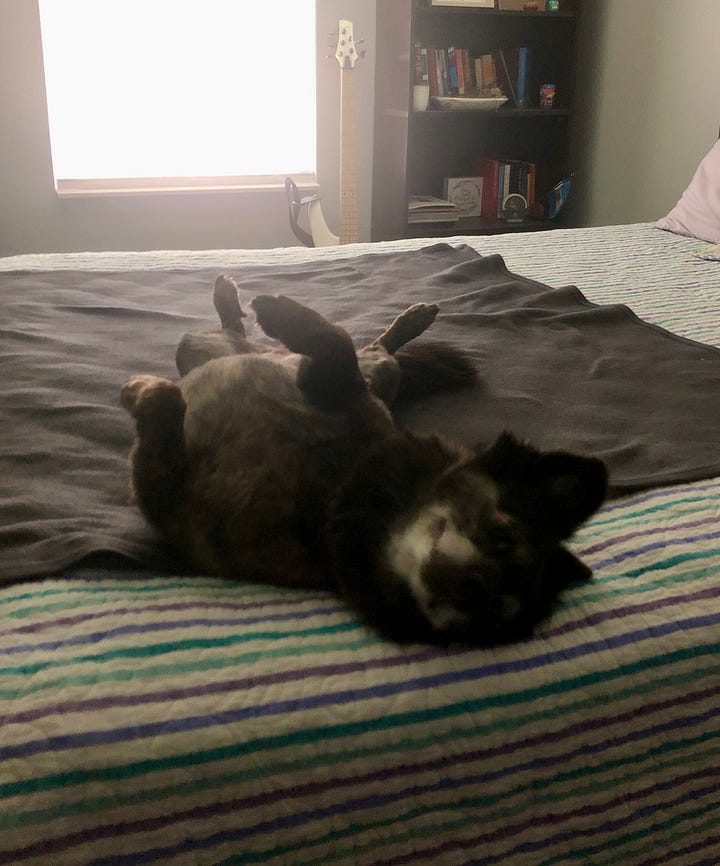
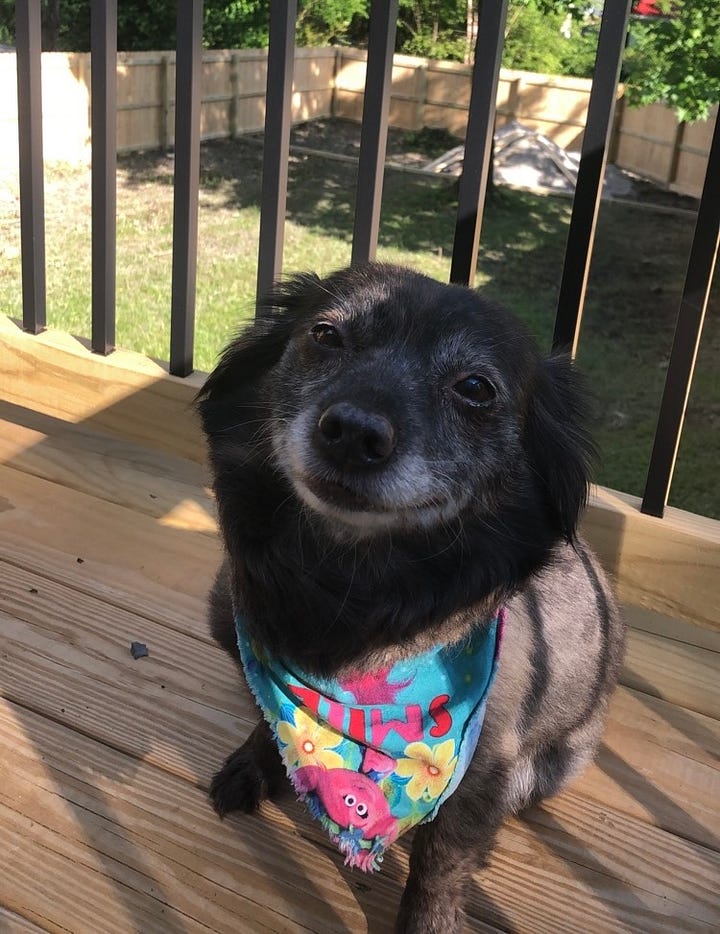
Gilda was called both “the sweetest dog in the world” by friends and strangers, and “the worst guard dog ever” by anyone I’d ever left a key out for, who’d enter to find her lying on her side, belly exposed, pleading for a rub.
I worry that I waited too long—that’s my one regret. I saw but didn’t see how bad she’d gotten since last summer, when her tail stopped wagging.
When Haley was pregnant with the first two children, Gilda followed her to every room, especially the kitchen, tripping her just to be close. Each night, she would sleep at her feet, not mine, while we watched TV on the sofa. By the time Elio showed up, in the fall of 2023, she was no longer so interested in being with us. But we chalked it up to the annoyance of small children, who tracked her down and pulled her hair.
Soon after, she began pacing through the day and night, only settling when she was let into the dark garage where, for the first time in a decade, she slept in a doggie bed and not a piece of human furniture. She was lying in that bed, letting me caress her, as I wept for hours before bringing her to Dr. D, knowing her time was up even as I hoped the vet would say, “She’s got another month, at least.” She died in that bed as we sat on the floor together and I rubbed her with both hands, wishing I had done so more after the kids came, or that I’d taken more pictures of us during the good times when we wandered Seven Islands and she chased anything she saw, or of our long car rides to New Jersey, or of her and the younger children, who will one day ask, “Who’s that old dog in your pictures?”, not remembering she was also theirs.
I can tell you many stories about Gilda that will remind you of the pets you loved, bringing them back to life for just a moment. Because the saddest true thing about dogs is that they don’t have souls. There is no Rainbow Bridge.
Gilda understood that.
She was never offered human food that wasn’t thrown to her by a child who thought it was the most hilarious thing ever to feed a dog a quesadilla. (Or that she’d scooped up from the floor in one zillionth of a second, like the avocado pit she swallowed while Haley made guacamole and then was forced to barf up with a tablespoon of salt.)
I never talked to her as if she were my daughter or anything other than a companion.
We had an agreement, the same one we made the first time we locked eyes. She did not bark or bite or chew up furniture or clothes. But when I was sad, she’d snuggle up beside me, all warm and soft, and I petted her until my sadness broke. When I was happy, I sang to her, and she wagged her tail so hard her lower body shook, dancing like we were at the after-party of the World Cup final. I kept her long hair short in the summer and bought her deer antlers and bones that she would try to swallow whole, and then, after I was sure she’d choke herself to death, soft treats in exchange for tricks she would eventually forget. (By the end, she got them just for being.)
She put up with her fair share, too: me trapping her behind baby gates, clipping her nails so short they bled, and tying her up in establishments where she could not roam free and say hello to every human ever, like she used to at the dog park. Until her final months, she was fine to be chased around the house by kids, as long as she got to lick the spaghetti off their faces when Haley wasn’t looking.
For a year before graduating from college, I worked at dog kennels and wanted, so badly, to adopt one of my own. So I did. And it could’ve gone so badly. I was 22, and I didn’t even own a bed yet. She was no spring chicken either. I’ve heard of friends having to give away or put down adult dogs who grew violent, or who had all kinds of illnesses. Gilda was a mutt’s mutt, impervious to disease that was not self-inflicted from eating garbage and crab apples. Her most serious medical condition before death was in 2020, when we had to cancel a vacation to Oak Island after what we thought was a UTI turned out to be bladder stones, which cost north of $1000 to have removed. “Gilda’s account is now at zero,” Haley said afterward, with kids the new Number One Priority/Expense, though she’d give us almost five more years before it really was.
I loved my dog, my first dog. I used to say, many years ago, that when Gilda was old enough, I’d adopt a puppy that she could train to be the Perfect Dog for Me—because that’s how I felt about Gilda. A calm, lovable, stoic, goofy, illogical, stray dog that took up residence in my heart and the entirety of my adulthood until Tuesday.
I’m gonna miss her.
Before you leave, support my work by upgrading to a paid subscription for as little as $4.17/month ($50/year). You can also buy me a coffee, order a copy of either my first story collection or my epic Ping-Pong novella, or listen to my stories on YouTube and Spotify.
There are so many stories of Gilda I could tell, but this description comes from an actual incident when she came with me to New Jersey, where my grandparents feed the sparrows in their yard so much bread that they’ve become immobile and obese, and she caught one and nearly had its head off before Nona smacked her with a broom and declared she was a savage. Many mice, a few small birds, and at least one baby possum were not so lucky.





